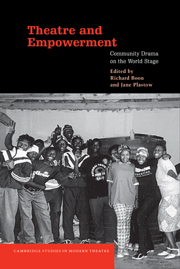Book contents
- Frontmatter
- Contents
- Notes on contributors
- 1 Introduction
- 2 The Wedding Community Play Project: a cross-community production in Northern Ireland
- 3 The Poor Theatre of Monticchiello, Italy
- 4 ‘What happened to you today that reminded you that you are a black man?’ The process of exploring black masculinities in performance, Great Britain
- 5 Wielding the cultural weapon after apartheid: Bongani Linda's Victory Sonqoba Theatre Company, South Africa
- 6 Dance and transformation: the Adugna Community Dance Theatre, Ethiopia
- 7 The Day of Mourning/Pilgrim Progress in Plymouth, USA. Contesting processions: a report on performance, personification and empowerment
- 8 South Asia's Child Rights Theatre for Development: the empowerment of children who are marginalised, disadvantaged and excluded
- 9 Theatre – a space for empowerment: celebrating Jana Sanskriti's experience in India
- Index
8 - South Asia's Child Rights Theatre for Development: the empowerment of children who are marginalised, disadvantaged and excluded
Published online by Cambridge University Press: 22 September 2009
- Frontmatter
- Contents
- Notes on contributors
- 1 Introduction
- 2 The Wedding Community Play Project: a cross-community production in Northern Ireland
- 3 The Poor Theatre of Monticchiello, Italy
- 4 ‘What happened to you today that reminded you that you are a black man?’ The process of exploring black masculinities in performance, Great Britain
- 5 Wielding the cultural weapon after apartheid: Bongani Linda's Victory Sonqoba Theatre Company, South Africa
- 6 Dance and transformation: the Adugna Community Dance Theatre, Ethiopia
- 7 The Day of Mourning/Pilgrim Progress in Plymouth, USA. Contesting processions: a report on performance, personification and empowerment
- 8 South Asia's Child Rights Theatre for Development: the empowerment of children who are marginalised, disadvantaged and excluded
- 9 Theatre – a space for empowerment: celebrating Jana Sanskriti's experience in India
- Index
Summary
Sunday, 18 March 2001: fourth day of the Doti TfD Training Workshop
Performance in a farmer's compound in Uchakot village, 2.00 p.m.
We are two-thirds of the way up the mountain, about 200 metres below the Bazaar on the ridge. We have turned a farmyard of old stone buildings on three sides into a makeshift ‘theatre’ for this warm Spring afternoon's performance. The fourth side is a spectacular view of the high Himalayas. Uchakot is a poor village, divided between Brahmins and Dalits –‘Untouchables’.
In the afternoon sunshine the children are seriously into performing the plays they themselves have improvised over the past three days. There is also an improvised play that some village leaders have created as part of the TfD Workshop. An audience of about two hundred villagers – men, women and children – surround the performers, engrossed in the plays. On one side of the impromptu stage there is a black drape and two life-size puppets pop up from time to time to interact with the children and the audience about the issues which the plays are presenting.
Everyone is enthralled, amazed – including we facilitators – that children aged between twelve and fourteen years, Dalits and Brahmins together, could in three days so successfully command the attention of this village audience, so delight them, challenge them; communicate with them so well. This achievement – the substantial issues of the plays, determined by the children themselves, as well as their new-found ability to improvise and act so convincingly in their roles – seems to have been plucked out of thin air, a spontaneous celebration of people and situations closely observed.
- Type
- Chapter
- Information
- Theatre and EmpowermentCommunity Drama on the World Stage, pp. 188 - 219Publisher: Cambridge University PressPrint publication year: 2004
- 7
- Cited by



